#supernal being
Text
Unseen Corner (Mage Supernal Being)
I didn't think it would be there. It's always in the last place you look. Why do I never look at the top of that stack of shelves? Did this room always have a window?
The Unseen Corner is a Supernal Being of hidden Spaces, especially those hidden in plain sight. The Unseen takes many forms, but all of them are small and diminutive. To a Mastigos versed in Life, it appears to be an ordinary mouse. To a Guardian, it is a mask buried in a rubbish heap. To mages with demonic or angelic Shadow Names, it is the classic Imp - a tiny, horn person with red skin, bat wings, and a pointed tail. As long as it is easily missed, it is a form the Corner can take.
The Unseen Corner is soft-spoken, rarely raising its voice above a whisper or calling attention to itself. Its unobtrusive nature means it is common for a summoner to not realize the Corner has appeared, except for the certain knowledge that the ritual worked.
Mages summon the corner when the want to be overlooked, interfere with surveillance, or shield their Sympathetic connections. It has a fondness for Guardians and Mystagogues, although neither Order get preferential treatment out of the deal. It does keep a Supernal eye on such mages however, watching them long past the terms of their summoning require. While the Unseen is ambivalent toward the Free Council, the Libertines frequently call on the Imp, as its trials are less harsh when it has the opportunity fuck with the Panopticon. It has no special hatred of Seers or the Exarchs in general, but if the Eye has its way, hidden spaces will cease to exist so the Unseen gleefully interferes with its minions plans.
The Unseen Corner is a reserved Imp, economical in its words unless it is pointing out a Mage's blind spots. It prefers to perch on ledges or hide in corners, anywhere it can easily be overlooked and spy on others unseen. The Unseen does not broke any suggestion that it is a hypocrite for spying while simultaneously working to dismantle the Panopticon. From its perspective, it is an individual who simply watches what happens around it from a hidden space in a limited area. The Panopticon, however, wishes to systematically eliminate all hidden spaces and observe everything. The few Seers who tried to sway the Unseen on this position met sticky ends.
Rank 2 Pandemonic Imp
Power 2 Finesse 7 Resistance 5
Virtue: Unobtrusive
Vice: Voyeuristic
Ban: The Corner cannot use its Arcana in ways that are easily witnessed.
Bane: A picture or painting of itself.
Arcana: Mind 2, Space 2, Matter 1
Mana: 15
Corpus: 7
Willpower: 10
Initiative: +12
Defence: 2
Speed: 11
Size: 2
Hey! This was originally made for my patreons over on Patreon. If you want more exclusive monsters, you can back me over there, but you can also follow for free and get email updates whenever I post new public content too!
#mage the awakening#chronicle of darkness#supernal#supernal being#imp#Pandemonium#RPG#Urban fantasy#Urban horror
13 notes
·
View notes
Text
.
#personal convictions suck#I will obey God but sometimes it's hard#especially if I dont know why exactly?#like for supern@tural#it's a stumbling block for me because i used to ship d3sti3l#but i miss the (good) stories#I miss De@n lol#i miss other characters too but#also they entirely dishonor God in the last season and I won't stand for or support that#but rn the Holy Spirit says “no” to @mazing digit@l c!rcus#and other than it being seemingly addictive I have no idea why#other Christians can enjoy creepy things?#idk im not questioning Him im just venting#also if you're wondering why I'm censoring its because i really dont want this to show up in fandom tags#i have been mocked by non-christians for my personal convictions in the past so#ALSO it just sucks because my friends like it and i cant like it with them#isolation~
2 notes
·
View notes
Text
"I think Homer outwits most writers who have written on the War [fantasy archetype], by not taking sides.
The Trojan war is not and you cannot make it be the War of Good vs. Evil. It’s just a war, a wasteful, useless, needless, stupid, protracted, cruel mess full of individual acts of courage, cowardice, nobility, betrayal, limb-hacking-off, and disembowelment. Homer was a Greek and might have been partial to the Greek side, but he had a sense of justice or balance that seems characteristically Greek — maybe his people learned a good deal of it from him? His impartiality is far from dispassionate; the story is a torrent of passionate actions, generous, despicable, magnificent, trivial. But it is unprejudiced. It isn’t Satan vs. Angels. It isn’t Holy Warriors vs. Infidels. It isn’t hobbits vs. orcs. It’s just people vs. people.
Of course you can take sides, and almost everybody does. I try not to, but it’s no use; I just like the Trojans better than the Greeks. But Homer truly doesn’t take sides, and so he permits the story to be tragic. By tragedy, mind and soul are grieved, enlarged, and exalted.
Whether war itself can rise to tragedy, can enlarge and exalt the soul, I leave to those who have been more immediately part of a war than I have. I think some believe that it can, and might say that the opportunity for heroism and tragedy justifies war. I don’t know; all I know is what a poem about a war can do. In any case, war is something human beings do and show no signs of stopping doing, and so it may be less important to condemn it or to justify it than to be able to perceive it as tragic.
But once you take sides, you have lost that ability.
Is it our dominant religion that makes us want war to be between the good guys and the bad guys?
In the War of Good vs. Evil there can be divine or supernal justice but not human tragedy. It is by definition, technically, comic (as in The Divine Comedy): the good guys win. It has a happy ending. If the bad guys beat the good guys, unhappy ending, that’s mere reversal, flip side of the same coin. The author is not impartial. Dystopia is not tragedy.
Milton, a Christian, had to take sides, and couldn’t avoid comedy. He could approach tragedy only by making Evil, in the person of Lucifer, grand, heroic, and even sympathetic — which is faking it. He faked it very well.
Maybe it’s not only Christian habits of thought but the difficulty we all have in growing up that makes us insist justice must favor the good.
After all, 'Let the best man win' doesn’t mean the good man will win. It means, 'This will be a fair fight, no prejudice, no interference — so the best fighter will win it.' If the treacherous bully fairly defeats the nice guy, the treacherous bully is declared champion. This is justice. But it’s the kind of justice that children can’t bear. They rage against it. It’s not fair!
But if children never learn to bear it, they can’t go on to learn that a victory or a defeat in battle, or in any competition other than a purely moral one (whatever that might be), has nothing to do with who is morally better.
Might does not make right — right?
Therefore right does not make might. Right?
But we want it to. 'My strength is as the strength of ten because my heart is pure.'
If we insist that in the real world the ultimate victor must be the good guy, we’ve sacrificed right to might. (That’s what History does after most wars, when it applauds the victors for their superior virtue as well as their superior firepower.) If we falsify the terms of the competition, handicapping it, so that the good guys may lose the battle but always win the war, we’ve left the real world, we’re in fantasy land — wishful thinking country.
Homer didn’t do wishful thinking.
Homer’s Achilles is a disobedient officer, a sulky, self-pitying teenager who gets his nose out of joint and won’t fight for his own side. A sign that Achilles might grow up someday, if given time, is his love for his friend Patroclus. But his big snit is over a girl he was given to rape but has to give back to his superior officer, which to me rather dims the love story. To me Achilles is not a good guy. But he is a good warrior, a great fighter — even better than the Trojan prime warrior, Hector. Hector is a good guy on any terms — kind husband, kind father, responsible on all counts — a mensch. But right does not make might. Achilles kills him.
The famous Helen plays a quite small part in The Iliad. Because I know that she’ll come through the whole war with not a hair in her blond blow-dry out of place, I see her as opportunistic, immoral, emotionally about as deep as a cookie sheet. But if I believed that the good guys win, that the reward goes to the virtuous, I’d have to see her as an innocent beauty wronged by Fate and saved by the Greeks.
And people do see her that way. Homer lets us each make our own Helen; and so she is immortal.
I don’t know if such nobility of mind (in the sense of the impartial 'noble' gases) is possible to a modern writer of fantasy. Since we have worked so hard to separate History from Fiction, our fantasies are dire warnings, or mere nightmares, or else they are wish fulfillments."
- Ursula K. Le Guin, from No Time to Spare, 2013.
#ursula k. le guin#homer#quote#quotations#the iliad#trojan war#storytelling#fantasy#fiction writing#war#conflict#tragedy#john milton#paradise lost#greek mythology
2K notes
·
View notes
Text
Merchant's Daughter (Part 1)
God! Aemond x Human•Fem! Reader
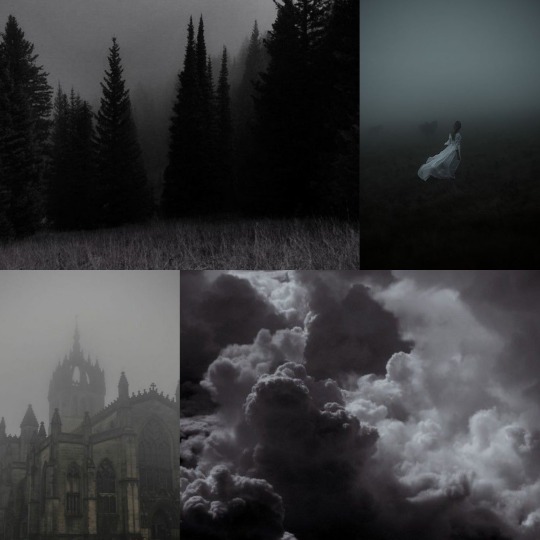
Summary: In order to ease the wrath of one of the Gods, the girl among humans is chosen to be gifted to him.
Part 2
To find more stories — masterlist
A/N: I'm inspired by a lot of things, by Greek mythology, by Beauty and the Beast story. Especially credits go to @flowerandblood. Some of her fanfics planted a seed of the idea for this story. I hope, you'll enjoy it! Reblogs and comments are always appreciated :) And English isn't my native.
Warnings ⚠️
Mention of death, typical treatment of women those times, she/her pronouns
MINORS DO NOT INTERACT
○○○○○○○○○○○○○○○○○○○○○○○○○○○○○○○○○
Once the world was different. Humans shared it with other supernal beings — children and creatures of Gods who ruled those times. Back then miracles filled the surroundings — here and there ehoes of satires' and nymphs' wild dancing could be heard in the dead of night, taken by the wind from the concealed domicile somewhere in the forests or fields, and brought straight to the towns where mortal people resided.
Fishermen spread legends of beautiful women with colorful fish-tails whose voice could enchant one and become the death of him. Sailors told about orphic castles barely visible in the fogs of the sea.
Humans were always weak and foolish, bonded to their towns and houses, lived their short mortal nugatory lives. They couldn't comprehend the broadness of the world, the depth and beauty of it.
Gods tried to take care of them, their miserable children. They gave them lands, rivers, domestic animals and fish. They taught them how to cultivate fields and grow crops, how to exploit fire. At times, humans got punished for their sins, Gods abhorred misbehavior of their gawky children. Frequently, they didn't even cast a glance at them, being immersed into their divine scandals and disputes. They didn't invite any humans to their heavenly palaces, nor did they marry earthborn men and women. Some Gods and Goddesses might have laid with beautiful representatives of the human race. Still, nothing more.
It was so only until one moment.
The calm day didn't foreshadow anything violent. Until the evening, when the sunset was painted in scarlet. Something terrible happened in the heavenly palaces — one of the Gods blood was spilled. That night the residents of the town near the sea didn't see the moon. Instead, the night sky was pitch black as the abyss of Chaos which the universe emerged from.
The God of Murk and Affliction lost his eye to his nephew — the God of Joy.
But, little Lucerys escaped the wrath of elder Gods and remained unpunished. After all, they couldn't harm him in order not to cripple him or knock all the joy out of him that he shared with mortals — such was his endowment. The issue remained unresolved, and angry Aemond was forced to live with one eye since then.
In a century, he met his nephew again, above the sea. There was no way to escape the God of Murk and Affliction that time. The little God was hopeless. And Aemond put his nephew through tortures, through his revenge which he had been nurturing in his dark heart for many years.
That evening the residents of the town near the sea saw a scarlet sunset once again. And in the hour of the owl, claps of thunder rumbled in the pitch black sky. The storm of madness swept across those lands — the herald of the victory and death simultaneously.
The sudden sadness and fear filled the hearts of people. The God of Joy was dead. His two eyes, cut out of the sockets, turned into two precious stones with yellowish glow. Still, there are gossips that they can be found at the bottom of the deepest sea.
Since then, there was no joy as such on the earth, people no longer took it for granted. If they wanted to be happy, they had to find things that could bring merry into their miserable lives.
But darkness and fear remained, more diseases developed among people, life became tough. Servants of the God of Murk and Affliction began residing together with people, punishing them for their indifference they showed on the day Aemond lost his eye. Nobody stood for him at that time. Everybody thought they would get away with it. Though, the Gods, humans, and other beings are paying off for their negligence now.
Plague, Doom, Pain, Fear, and Sorrow are terrorizing people. They have infiltrated into the towns' walls, they are hiding in the shadows, every now and again preparing to attack a poor mortal soul.
The Gods and supernal creatures are trying to avoid the lands where the God of Murk and Affliction lives, being well aware that they can meet their death in the form of Vhagar — Aemond's monstrous beast, so enormous as a mountain.
Many centuries passed in the town near the sea. One day the Goddess of Wisdom bestowed the place with her presence and shared a piece of advice with people.
Opt a young maiden girl, and gift her to the God of Murk and Affliction. As a mighty man he is, he won't refuse to satisfy his carnal needs with an innocent mortal girl. It may sooth his wrath a little, and he may order his servants to stop terrorizing humans. At least, not frequently. One girl isn't a big price comparing the whole humanity.
And so was it. The government, the judges, and the public presented the most beautiful virginal girls to the heavenly court. The choice fell on the youngest of merchant's daughters — a poor being who was soon to be sent to the remote lands, right into the hands of the ruthless God.
The day her family was preparing her to the long journey, she was silent and pale. It seemed that all liveliness faded away from her eyes. Before going out to the carriage, her mother sat with her in the chamber to conduct a woman talk.
Be obedient. Do what He orders. Be flexible. It doesn't matter that he's a God, still he's a man that isn't deprived of needs that even humans possess. Your feminine power isn't between your legs, first of all it's in your mind. Use your head in the right way, and who knows, perhaps, even the God of Murk and Affliction will fall on his knees in front of you. The doings that a man and a woman perform in the bed chamber aren't always about pain, it may bring a great satisfaction and fulfillment for both of them.
At that time the words of the woman had no sense for the girl. But she only nodded, believing her mother. After all, the merchant's wife was known for her acute mind and wisdom. And beautiful curves of the body that all her daughters inherited.
Then, the girl settled in the carriage, and she with the convoy, consisted of several men, set off to the remote lands.
The journey took long days when they finally reached the dense woods. It seemed that places there were deathlike, shrouded in impenetrable thick fogs.
The carriage stopped and soon its door was opened.
"We've arrived, my lady. We won't go further, we are to leave you here," the servant of her father stretched a hand to her and helped her to get out.
Her nose immediately caught the moist raw scent of dead leaves and moss. The space around was dead silent. The sky was grey and cloudy — no signs of the sun, moon, and stars. Here and there hollers of ravens were heard. Vultures were circling above the trees, probably looking out for a half dead prey.
Shivers ran across her spine, the breath caught in the lungs.
The case with her belongings was stated at her legs. The girl turned to look at the servants of her father. They only gave her a sad smile and nodded, turning the convoy back.
She was left alone in these cursed lands. Abandoned by the whole world.
The girl looked around trying to figure out what to do next, and having no idea where to go, who to search for, she took her case, and just went further into the mist.
She couldn't tell whether she'd been walking for hours, but soon enough she noticed the outlines of the high fence which was visible in the distance. When the girl reached the gates, she stopped and placed the case on the ground. Beyond the large fence, the grim castle stationed itself. She felt that something tugged in her stomach, and stuck in the throat. Fear. Pure terror washed over her body. The sudden feeling of millions of eyes watching her prickled the petite body. But there was no one around her. At least, she thought like that.
All at once, the heavy front doors opened and she saw a tall man going down the stairs, directly on the lane bestrewn with gravel. He must have been the one who was going to meet her.
#aemond#aemond targaryen#house of the dragon#prince aemond#aemond fanfiction#aemond fic#aemond one eye#aemond x reader#aemond x you
255 notes
·
View notes
Text
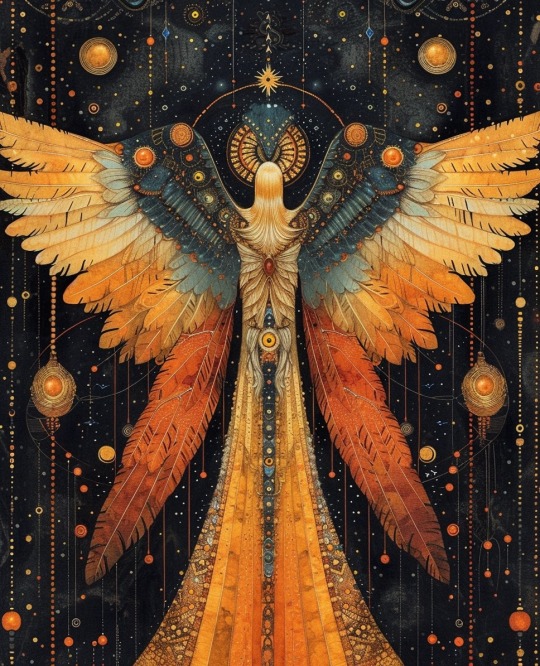

Solar Angel
Contact with the Solar Angel
The Solar Angel channels life from the Monad to the lower self, responding to karmic necessities and orchestrating a sequence of incarnations through which the individual can gain evolutionary experience. The Solar Angel’s point of attachment to the human individual is the causal body. It links the mental permanent atom on the first subplane with the mental unit on the fourth. Between these subplanes lies the great gulf that has divided us, since our inception as human beings, and which eventually we seek to bridge by constructing the antahkarana.
The causal body is a sheath that contains the astral and physical permanent atoms and the mental unit. It is the lowest vehicle to survive from one incarnation to the next, and through the three permanent atoms (for convenience treating the mental unit as such) serves to preserve a distillation of the experiences from successive incarnations. Prior to physical birth, life flows down from the causal body to the lower mental, astral, and physical planes, energizing the permanent atoms and sweeping the devas of those planes into action to build the new incarnational form. 29 At the end of that incarnation, life is withdrawn from the lower vehicles, and the permanent atoms are enriched by what has been learned.
For millions of years, the lower self is unaware of the Solar Angel’s existence. For its part, the Angel looks down on its charge, like a hen brooding over its egg, waiting for the first stirring of awareness that can develop into more definite contact. In the Tibetan’s words, the Solar Angel “is in deep meditation for the greater part of the cycle of lives of any one individual, and that it is only when a fair measure of personality integration is set up that the soul’s attention is drawn away from its own interior considerations and egoic affairs to those of its shadow.”
Techniques for developing contact with the Solar Angel can be found in many esoteric systems, whether or nor the concept of the Solar Angel is properly understood. For example, Ron Scolastico’s popular book Doorway to the Soul provides an interesting sequence of meditations that could be used even by people with minimal esoteric training. 31 As the individual invokes his or her Solar Angel, the Angel responds, at first sporadically and then more continuously. Golden Dawn initiate Israel Regardie provides an eloquent description of the process:
The everlasting abode of the Higher Self is the Eden of Paradise, the supernal sanctuary which is ever guarded from chaos by the flaming sword of the Cherubim... From that aloof spiritual stronghold it gazes down on its vehicle, the lower man, evolved for the purposes of providing it with experience—involved in neither its struggles or tribulations, yet, from another point of view, suffering acutely thereby… (S)eldom does th(e) Genius leave its palace of the stars except when, voluntarily, the lower self opens itself to the higher by an act of sincerest aspiration or self-sacrifice, which alone makes possible the descent of the Light within our hearts and minds.
The Tibetan makes a similar point and goes on to emphasize the need for a reciprocal response in building the antahkarana. He tells us that, “as it lives its own life on its own level of awareness,” the Solar Angel “is not always constantly aware of its shadow, the personality, in the three worlds. When the antahkarana is being built, this awareness must be present alongside the intention of the personality.”
Some types of service can only be performed with the Solar Angel’s participation. For example, the Tibetan explains that the practice of white magic requires the Angel’s resources:
Only the solar Angel can do the work of the white magician, and he effects it through the control of the lunar angels and their complete subjugation. They are arrayed against him, until, through meditation, aspiration, and control, he bends them to his will and they become his servants… The worker in white magic utilises ever the energy of the Solar Angel to effect his ends. The dark brother works through the inherent force of the lunar lords, which are allied in nature to all that is objective.
Similarly, in that important application of magic, healing:
The healer who works on a higher level, and necessarily therefore with a higher type of patient; he uses the energy of his own overshadowing soul in conjunction with the energy of his individualised soul, and thereby radiates it forth into the soul of the patient, via both of the auras.
If white magic requires the Solar Angel’s assistance, magic ritual has also been explored as a means of invoking the Angel. The most famous ritual for that purpose was recorded by the medieval Kabbalist Abraham the Jew (1362-1460), but attributed to a sage, Abra-Melin, whom he claimed to have met in Egypt. 36 What is particularly significant about Abraham’s work is that, in a preamble to the ritual, he dismissed the then-customary use of elaborate magic paraphernalia to emphasize a life of prayer and concentration, akin to the spiritual practices of the mystics—or indeed to our own esoteric disciplines. The early 20th century occultist Aleister Crowley adapted Abra-Melin’s ritual to invoke what he termed “the knowledge and conversation” of the Angel.” It is not clear whether Crowley succeeded, but he affirmed that the central role of ritual is “the invocation of the Holy Guardian Angel; or, in the language of mysticism, Union with God.”
Another ritual for invoking the Solar Angel, used by members of the Golden Dawn, focuses on participants’ personal transformation. Interestingly, it refers to the “true Self,” a phrase often used by the Tibetan:
Come forth unto me, Thou that art my true Self: my Light, my Soul… Thou that art crowned with Glory… Thee I invoke. Come forth unto me, my Lord: to me, who am Thy vain reflection in the mighty sea of Matter… Without Thee I am nothing; in Thee am I All-Self existing in Thy Selfhood to eternity.
Yet another includes this affirmation of personal sacrifice and sacrifice and courage:
Let the influence of thy divine ones descend upon my head, and teach me the value of self-sacrifice so that I shrink not in the hour of trial, but that thus my name may be written on high and my genius stand in the presence of the Holy One. In that hour when the Son of Man is invoked before the Lord of Spirits and his Name before the Ancient of Days.
41 notes
·
View notes
Text
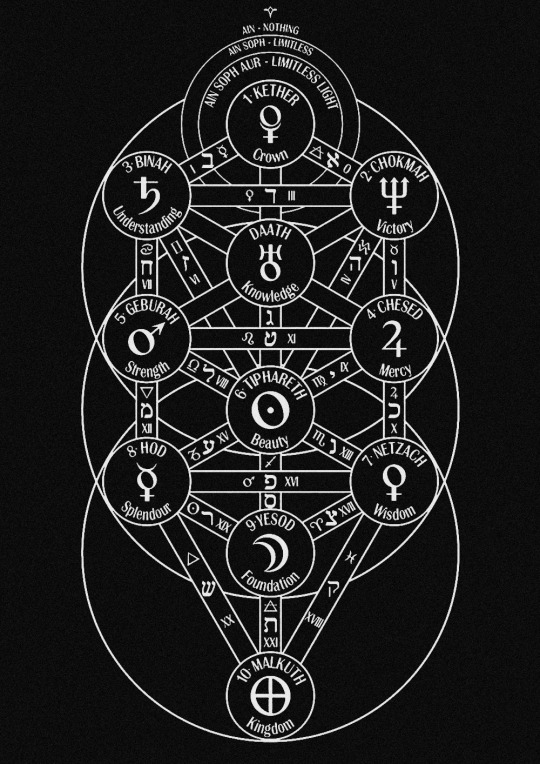

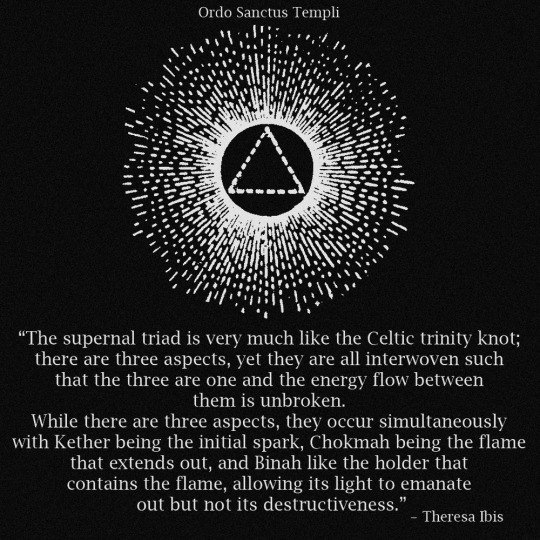
The Tree of Life - Binah - Kabbalah and the Sephirot
Binah is the womb from which all souls are born, Chokmah the energy that the soul is made of, and Kether the idea of the soul within the Monad itself. In fact at the level of the Supernal Triad, Kether is the self-realization of the Supreme Being that emanates from En Sof, Chokmah is its Living Spirit and Creational Force, and Binah is its Supernal Soul Body through which the Spirit may interact with the lower realms of creation. The soul has always been associated with a feminine energy by Kabbalists as well as many other traditions. Similarly Binah is the Supreme Feminine Archetype, while the Spirit, Chokmah, is the Supreme Masculine Archetype and Kether, the Supreme Union Archetype. Chokmah and Binah are El and Eloha, the creator God and Goddess of this system, together in Divine Union and balance they are Elohim. Kether, however, is neither masculine nor feminine, it just is. The god name associated with Kether is EHEI (Eheyeh), which means “I Am” or “To Be”.
The supernals are the “3 mothers” associated with the Hebrew Letters Shin (spirit/fire), Aleph (air), and Mem (water), which are also the 3 mother rays of Amon Ra: numbers, letters, and sounds that are used to write the name of God, from which all creation comes. The third ray, Binah (Mem), being the one from which all other rays and creational energies are birthed or emanated out from. We see this in the Kabbalah by the path that the lightning bolt or ‘flaming sword’ takes as it carries the creational energies down from source to Malkuth. Binah is the last of the supernals that it enters before coming into the lower realms. Thus, Binah is the closest of the supernals to the world of form, hence it is the original archetypal form, whereas Chokmah is the original archetypal force. These roles of form and force can also be explained through the beginning stages of creation.
Before the beginning of creation there was only En Sof. En Sof was everything, yet no-thing, everywhere and nowhere, all potential but nothing manifest… At this stage En Sof does not even know it exists and has no concept of creation. And then a contraction occurs. En Sof contracted within its own being and from this withdrew from an infinitesimal point. This point became the center and it was a void. But even in its state of void, it still contained the memory of the essence of En Sof that previously was there. This center point of all existence is called the Shekinah by some Kabbalists – the feminine aspect of En Sof. In the very instant that En Sof contracted and this void was formed, so too did the infinite capacity of En Sof move to fill the void, for there can be no place that is not one with En Sof. As the energy of En Sof moved into this infinitesimal point it became a concentrated and intensified spark of light. This spark of light is Kether (the Center Point of the Universe). In the same instant, the intensity filling this point became so great that there was an outward explosion of light and energy moving in all directions. This dynamic expansion is Chokmah (the Big Bang and the photons/energy of light). But the influence of the feminine aspect to define the space and allow for creation was still present as a reflection of the Shekinah, and this influence served as a vessel for the energy to pour into and then subsequently be channeled through towards manifestation. This vessel or womb that channels and directs the light is Binah (Primordial Matter, which leads to Gravity, which is an attractive force that draws things into form). Einstein’s famous equation E=mc2 can be related to the supernal triad, where E is Energy, whose essence is derived from Kether; c is the speed at which light travels outward from its source, which is Chokmah; and m is the mass of matter, which can be likened to Binah. The union of matter and the speed of light (mc2), Binah and Chokmah, releases an extraordinary amount of energy (sourced from Kether) that can be used for creation below the Abyss.
Thus the light flows on across the Abyss, through Daath, and on to Chesed then down the rest of the Tree until it finally reaches Malkuth. But it is Chokmah that generates the life force energy that enlivens the process of creation, while Binah is the womb that holds the egg that, once impregnated by Chokmah’s life-giving seed, becomes the vessel that gives birth to the other 7 sephiroth.
Geometrically, these initial stages of creation are represented by nothing (En Sof), the empty/black point (Shekinah), the full/white point (Kether), the line (Chokmah), and the triangle (Binah). Thus Binah is also the foundation of the entire Supernal Triad, whereas Kether is its root/source, and Chokmah its life force, and En Sof is the unseen/unknowable essence that flows through all of it. The triangle is the first form created and thus it is the primary key to the powers of heaven (the square and circle being the other two keys).
The supernals are in a realm that is beyond the human mind, thus any discussion of them can only be limited to metaphors and symbolic language. And because they are all just three aspects of a unity, it is difficult to say anything about any one of them alone. To say anything at all is to define, separate, and limit, thus not a true representation of the supernals. And yet, often in books these are the three parts of the Tree that are given the most attention – perhaps because they are the furthest from what we are acquainted with and hence the most mysterious and alluring. But truly, the only way to come to know and understand the supernal realm is through direct experience, which is the purpose of the ascension up the Tree of Life, which culminates in the crossing of the Abyss. This ascension brings one the vision of seeing God “face-to-face” – the inner and outer God. This experience may only be a momentary glimpse, but even that is enough to change your life, and it will give you the experience through which wisdom and divine light may illuminate your entire being.
27 notes
·
View notes
Text
A Magnus (Protocol) By Any Other Name…
…will be just as horrifying.
Well, it’s time for me to dust off the corkboard, unravel some fresh red yarn, and cook up some new incredibly wrong but passionate theories. First one is bouncing off some key points:
1) The Magnus Protocol’s logo is composed of certain alchemic symbols, chiefly a version of the sign involved with creating the Philosopher’s Stone; the catalyst for riches and the Elixir of Life’s gift of immortality.
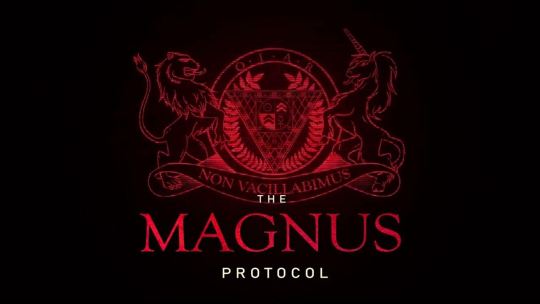
Especially tasty to consider, what with the first episode introducing us to poor Red Canary who discovered the ruins of the Magnus Institute were host to some strange symbols of its own inside.
2) A fellow by the name of Saint Albertus Magnus was kicking around in the 1200s and, like that famous French scribe Nicolas Flamel, he got a hefty posthumous reputation for having been a great alchemist on top of being a philosopher and scientist.
What does this add up to? First, I want to look at identity possibilities when it comes to who the Magnus(es) in question might be here.
Theory A: Jonah Magnus was part of a lineage with an itch to chase the more-than-earthly and, naturally, immortality. If not a direct descendant, then a sibling or cousin line. Can’t say Albertus would be jumping to congratulate the bastard for his ‘success story.’
Theory B: With apologies to the actual Albertus, maybe Jonah is that original alchemic Magnus. Or at least he wore the guy once upon a time and kept the surname. Maybe he fudged the ye olde records some centuries back. Death records, life records, whether or not old Al ran into some unsavory character with unpleasant gray eyes…
Theory C: Circles a bit back to A, in that Jonah wasn’t the only one in his family tree poking around supernatural and supernal forces. Assuming Jonah existed as himself at all in this place. Someone or something else might have been running this world’s Magnus Institute before it was roasted. While the current assumption is that the cast of characters we knew in The Magnus Archives might exist within TMP’s universe as themselves, we don’t have all the pieces yet.
Fun stuff!
But oh. Oh boy. I am chewing apart the implications of the main logo and the ‘protocol’ like an excited dog. Specifically, the possible implications of the Philosopher’s Stone symbol visible in the logo not being this…
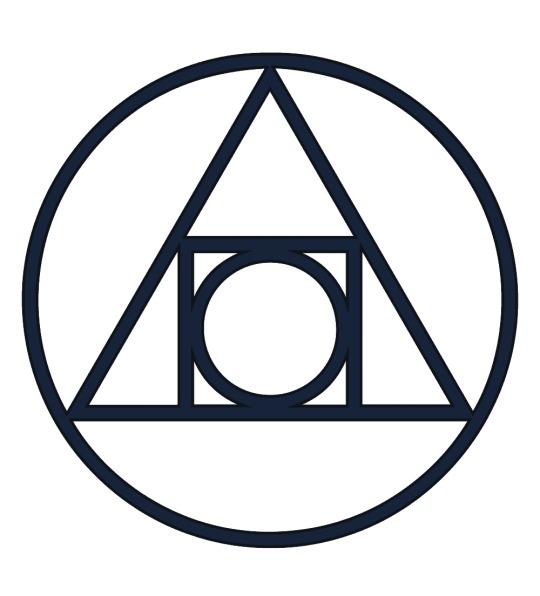
…but this.
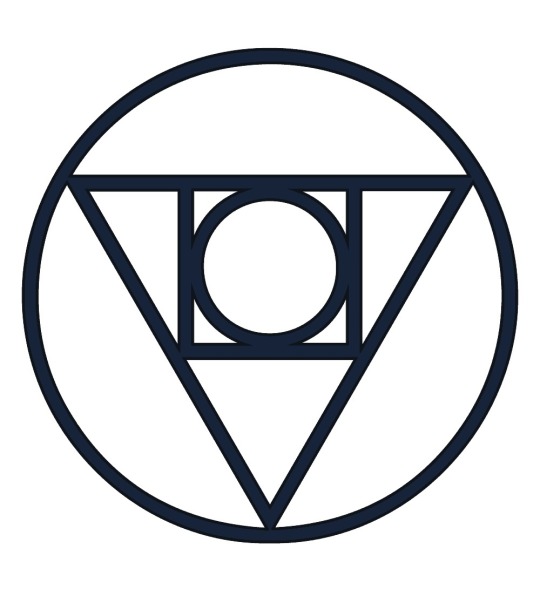
The sign is inverted. Which shouldn’t mean much, right? All the other little symbols chilling in there are right side up, what’s the big deal?
The same kind of deal that we see in the difference between a pentacle, associated with magic and pagan faiths in various forms:
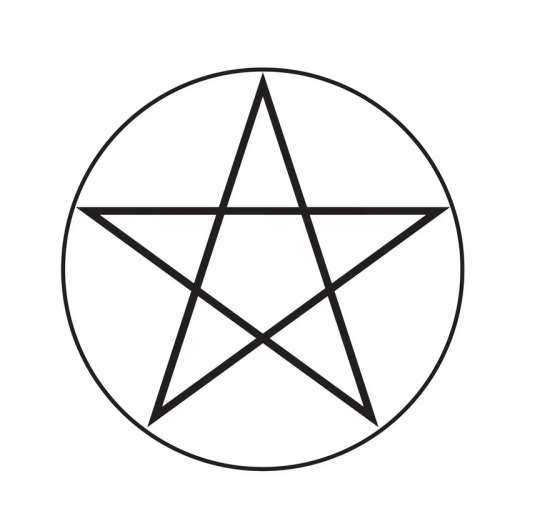
And a pentagram, associated point blank with outright devilish and demonic dabbling:
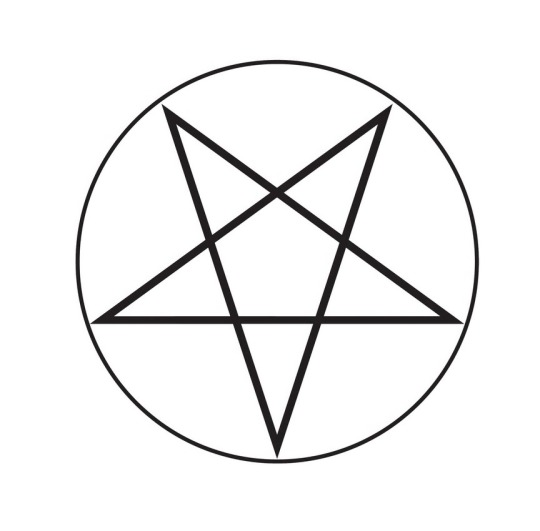
Or, if you’re up on your Tarot, you know that there’s a world of difference between getting your card right-side up (delivering on the image’s classic meaning) versus flipping it to see the picture inverted (the opposite of the original intent).
So what does that mean for the TMP’s symbol, the same stamp which we might assume the Office of Incident, Assessment and Response has on their workplace? My guess: This is the insignia of a force or founder who put the ‘protocol’ in The Magnus Protocol. A foundation based on actively opposing what they took to be forces of a classically alchemic and/or infernal nature rather than the cosmic horrors we know the Fears as.
The Enemy is using these powers to evil ends. The Enemy is made of monsters. The Enemy includes Jonah Magnus, the spoiled offshoot of Albertus Magnus. Our sign is the opposition to his and others’ vicious quest.
Or suchlike.
In the style of Gertrude Robinson, the original person or persons behind the Protocol and our main characters’ Office appears to have hit upon a ‘fight fire with fire’ reaction to the Fears. We see how Alice, a veteran employee of the Office, displays a strong insistence on categorizing its statements very, very loosely, and actively not prying into deeper research in the way a place wholly possessed by the Eye would encourage. She’s seen people go strange upon following the lure of weirdness; but she knows from experience that the Office can be worked in jovially enough, sans side effects. The implication being that Colin is sprinting down that rabbit hole, poor dude.
If the OIAR is of the Eye, it is also against the Eye. Against all Fears, even as it absorbs statements of their actions. Feeding its patron while also cutting back the portions by way of not being too careful about the filing or the tasty background research. If the Eye is present at all in the Office, then it is settling for granola bars versus Jonah Magnus’ offered banquets.
Which all comes back to the question of:
If Jonah Magnus founded the Institute here, who is responsible for the OIAR?
My pet favorite is the ‘one who got away’ as far as Jonah’s classic 19th century days went—one Dr. Jonathan Fanshawe who got an eyeful of a victim’s blinking innards and broke ties with Magnus like they were pretzel sticks. We never do find out what became of him afterward.
His last written words to Jonah ran:
Nothing stood in the way of my retreat, and I dragged Albrecht’s body back as far as the coach. We left that awful place, and I have endeavored most acutely to forget the route.
Before he was buried, I was able to secure permission to do an autopsy. I had some thought as to discovering the cause of his sudden, violent passing. Do I need to tell you what I found, Jonah? Do I need to detail what covered his organs, his bones, the inside of his skin? What clustered together in their dozens, and all turned as one to focus on me as I opened his chest, their pupils constricting in the light, with irises of every hue and color? Because whatever it was that did this to him, I know in my heart that it is your fault.
I have had the body burned. Please do not write to me again.
Your obedient servant,
Doctor Jonathan Fanshawe.
You can feel the polite antique ice on that goodbye. Just as we can read here, and glean from his full letter, that the whole experience surrounding poor Albrecht is one he actively wishes he could forget. To not examine. And, of course, there’s the baited hook of Jonathan Sims’ next lines after reading the letter aloud:
Statement ends.
(sigh) Disconcerting to find my namesake in a statement, especially one connected so directly to the Institute. I can only hope breaking faith with Jonah Magnus didn’t go too badly for him.
I can’t think of a better ironic hell for the good doctor than to find himself the abrupt focus of the Eye all over again. Especially when the meat of the letter-statement involves this scene:
“I had them rebound last year,” he said. “Damp can do terrible things to a book.” I told him I was certain that that was the case, but I must insist we talk about his health. Again he ignored me. Instead, he took the seat opposite me and started to tell me a story. And then another. And another. A stream of strange tales began to pour out of him, and I just sat there, transfixed, desperately wishing I had the strength of will to leave, but all I could do was listen.
He told me of a seamstress, who laced her body with fine black thread, and when she pulled it all out in a single swift motion, her skin dropped away like a loose shift. He told me of a man so scared to die he spent a year weaving a rope blindfolded, so he would not know the length, and could not foresee the moment it would tighten around his neck when he finally threw himself into the void. He told me of a fire that burns so hot and fierce that to even know about it is enough to burn a man’s tongue from his head. He told me so many terrible things.
And at the end of it all, the only thing I could think to ask him was where he read them. My eyes darted to the books that surrounded us, but Albrecht laughed at this, and placed his hands across a spine that was simply labeled ‘A Warning.’ For a moment, he looked as though he were about to wrench it from its place and hurl it into the fire. But it passed. He turned back to me. “You do not understand,” he said to me in German. “I do not read the books. They read me.”
Isn’t that something? A crossing of paths with the Eye that wasn’t just inflicting its Stare upon him through a victim or an avatar, but effectively pinning Dr. Fanshawe in the role of the unhappily avid audience, however briefly. Forced to absorb a litany of horrors as another Jonathan would so many years later. Good foundation for someone who, upon discovering the insidious supernatural Powers That Be were not about to leave him alone, would try his best to turn that force into something to use against the monsters. A habit among Archivists who’ve had Jonah Magnus inflicted on them.
Assuming it is Fanshawe at the roots here, the act of designing a symbol centered on inverting the Philosopher’s Stone sigil makes sense. Cosmic and eldritch horror wasn’t really on the table for that era. But the demonic and the arcane were. As were, we can assume, history books to do with famous old Albertus Magnus and his possible connection to Jonah ‘Wants to Be an Immortal All-Powerful Specialboy’ Magnus. Whether it’s Dr. Fanshawe behind the OIAR’s inception or not, having it be somebody from Jonah Magnus’ early days works out—they would assume the bogeymen at work were merely hellish, nothing broader.
Plus, there’s just plain narrative convenience to consider. ‘19th century guy knows Magnus is up to shit with his Institute. Gets suspicious. Gets avatar’d against his will. Gets proactive about it. Named Jonathan, good for a bait-and-switch down the line.’
But, I could obviously be 1000% wrong, as per usual with ¾ of my Magnus-flavored theories. It could be someone or something entirely unrelated, though I’m keeping my fingers crossed for Fanshawe. Especially when I stop to think about how very fond the Fears are of avatars who play hard to get, forcing their essence and power on those who want it least.
The arachnophobic Annabelle Cane.
The endlessly exhausted Oliver Banks.
The goodwilled and betrayed Michael Shelley.
The empathetic sacrificial lamb of Jonathan Sims.
And perhaps, there at the start, Jonathan Fanshawe. Seeing and being Seen, balking at the Ceaseless Watcher’s work and the stories it wanted to share with him. Maybe, maybe.
We’ll just have to wait and See. 👁️
#guess who's back on the wildly inaccurate theorizing bullshit babeyyy#the magnus protocol#the magnus archives#jonah magnus#albertus magnus#jonathan fanshawe#theory
50 notes
·
View notes
Text

The Burning Bush
“The burning bush unfurls the dream fire.
Its streams flow as fields suffused with doors that bestow vision like windows.
A body of layered veils disrobing, always star-filled, always empty.
The burning bush is mind stripped bare.
Overlapping the forms of earth into the lamp of darkness.
Dreamscape and dreamer collide beyond category.
Revealing the root of broken universes, flaming seal of ground and sky.
The condition for its realization rests within the ruach of a human being.
What shall you make yourself?
Body of veils = ordinary perception
Disrobing = aspiration to gnosis
Stars = sparks of luminous essentiality
Broken universes = result of habits of conventional perception
Gates of the ruach = daat/yesod; pans of balance for gnostic intoxication
Upper daat cultivated through lower daat
Clarity of the dream and realization of its supernal basis balance on scales
Yesod as gate of alchemical marriage, daat as gate of crystalline dew
Sealing the unsealable by name ShaDaiY (314)
Equal with Metatron, who opens gates
The self-consuming flame is the triple shin (ruach ALHYM/300):
Shin = blaze of the dream
Dalet = open door
Yud = dream's thrust
Yesod integrates/obstructs marriage in two possible ways:
Simultaneously as Tree of Life (right): yesod in center
Gradually as Tree of Daat (left): yesod at lower periphery”
From “The Blazing Dew of Stars” by David Chaim Smith (2013).
38 notes
·
View notes
Text
TAKE ME TO THE DARK
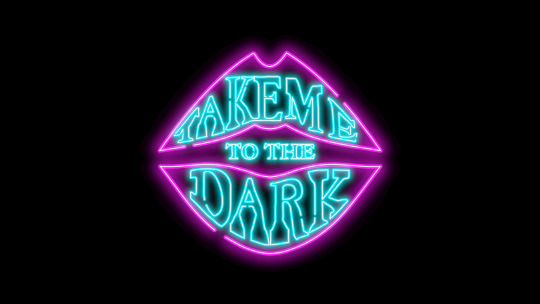
Take Me to the Dark: 3 Games of the Strange by Publishing Goblin — Kickstarter
In early October, TAKE ME TO THE DARK: 3 Games of the Strange is coming to Kickstarter! Click the link above to signup and be notified of the campaign's launch!
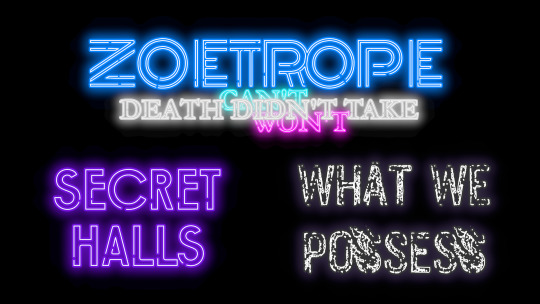
Take Me to the Dark: 3 Games of the Strange by Publishing Goblin — Kickstarter
Three card-run TTRPGs that take little to no preparation to sit down and play, not even for the person(s) running the story. $25 a piece, or $60 for all three games in a bundle.
ZOETROPE: Death Didn't Take is the second edition of time travel madness! Play time agents trying to stop (or cause) time anomalies in a ridiculous game. Build the timeline on the table with your action cards, so when you rewind (or fast forward) time, you know exactly what did or didn't happen.
SECRET HALLS is 1993 Chicago urban fantasy at its best. You are mages tasked with keeping the peace between other mythological beings, while trying to keep the mortals blissfully unaware of the supernal dream hiding in the dark alleys of their city.
WHAT WE POSSESS is a game of vignettes of the living, paired with the onlooking hunger of the dead. Figure out why your ghosts are haunting this space before their energy fails and they fall to the Whispers that keep them locked here.
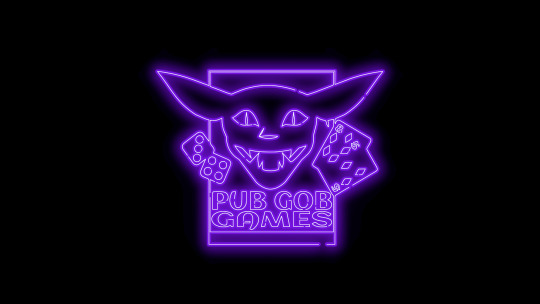
#kickstarter#take me to the dark#ttrpgs#ttrpg#rpg#indie rpg#indie ttrpg#secret halls#urban fantasy#zoetrope#time travel#what we possess#ghost#ghost story#haunting#october#halloween#scary games#scary stories#strange
72 notes
·
View notes
Text
Healing Aurora | First Meet - Wooyoung

❂ Summary: Supernatural Inn & Spa Owner/Keeper!MC x Multi-route (haha... ik)
❂ Characters: Jung Wooyoung
❂ Genre: General/Supernational
❂ Warnings: N/A
❂ Word Count: 2070
❂ A/N: Phew, finally chapter one is out! I really hope you guys enjoy this! Give me a reason to want to continue writing this
Banner credit to my friend once again, she was so sweet to help me make simple mood banners for each chara
You felt your heart pick up its pace when two figures came running up to meet the four of you. You were frightened by the speed they were coming at you, but with a hand raised, the two figures slowed down at Hongjoong’s command. You held your breath as they came to a stop before you. Their eyes were bright and expectant, but you had no idea what they were waiting for.
Were they expecting something from you?
Silence hung around the room, your eyes glancing back and forth between the two males that stood before you with anticipation. You scratched your cheek.
“Um… How can I help you?”
The redhead’s expression changed to a solemn one. He quickly gazed at Hongjoong in confusion, but Chan answered his unspoken question instead.
“They lost their memories, but it seems some would return when physical contact is made.”
“So they don’t remember me right now?”
His voice sounded so broken, making you feel bad for not remembering who he was. He looked like you meant a lot to him with how he reacted, unlike his black-haired mate, who stood next to him with a frown and a hand on his shoulder for comfort.
“Would you like to make physical contact? I’d like to know who you guys are to me too. I feel terrible for not remembering.”
He did not need to be asked further. He closed off the remaining space between you and coddled you into his arms. Your eyes sparkled the same way they had the previous three times. You heard a soft prayer from him, “Please remember me, princette,” before you were thrown into a whirlwind of memories.
- - -
As a Tanuki, Wooyoung was often seen by humans as a bad omen. They never wanted him around, and, despite wanting to be a part of a family, not even the supernaturals wanted to be around him. The stigma around his legend was well known to the point he was sent malevolent glares daily by all. That did not stop him from being a trickster, though. Instead, they fueled him to cause mischief more.
He played around with humans. Ruined relationships, fixed relationships, found some friends, made some enemies; all of it was fun and games until he met you. It was you who opened his heart to the feeling of loneliness. He may not have been alone, but before meeting you, he was lonely. The twinkle in his eyes now was never fully there back then. Instead, he lived life half-full before you came into his life. You were a wonderful breath of fresh air to him.
You had worked at the inn for a little over a year now. Your master had passed the inn down to you. Choosing you out of the handful of people from your clan to become the next interworld innkeeper. You learned quite a lot in the year-long succession, but you knew there was still more to learn. After the year, you were forced to man the place by yourself as she had up and disappeared one day with just a farewell letter.
You had no idea how your master could take care of this inn all by herself but remembered that she was a half-breed or, what was called, a halfling amongst us (not to be confused with beings who are half as short as humans). You were also a halfling, but unlike her, you had not yet developed the ability to harness elements of any type. A breath of sigh left your lips as you made your way to the front yard of the supernatural side, but a voice from the entrance stopped you from your work.
“Oh~ What’s this?” A male looked around curiously, a playful smile plastered across his face.
“Welcome to the Eternal Sunshine Inn and Magic Spa, where our motto is: we melt away your problems guaranteed.”
He raised his eyebrow at you, “What a weird name and motto. Not all problems can be solved with a trip to an inn for a spa trip, ya know.”
“Maybe not, but the motto has not once failed. When we guarantee a solution, we mean it.”
And you truly do. The reputation of this inn was one of the best, and you know, damn well, that today will not be the first time the motto’s failed. So you did what you did your best and catered to his needs. Once you had him settled in a room under his name (which he introduced himself as Brian), you returned to the front yard to resume your duties.
Moments later, a kitsune entered the inn with a request for entry to the hot spring. You led the way and left her to her own devices. As soon as you stepped foot into the front yard, you were forced to greet another guest. One after another, it was nonstop. Different species of the supernatural and humankind entered your inn, yet you took a moment to realize how empty it was—despite all these entries.
It may have taken a while, but you were slowly figuring out the prank. A chuckle escaped from your lips as you covered your mouth. You hope he did not hear you.
The following person entered while you huffed and brushed the broom against the floor. This time, a man with red fluffy hair. He had a beauty mark on his lip and under his eye. You found them very pretty and could not help but blather about it. This pulled a blush over his cheeks.
“How can I help you today?”
“Can I get a room?”
You nodded, leading him to the front desk. You asked for his name, to which he answered, ‘Wooyoung.’ When you finished, you handed the card to him, and your eyes sparkled knowingly.
“Well, Wooyoung. I hope this is your real name and not all the other ones you gave me,” you made sure to give him a smile, “or is this also a fake, just like Brian was?”
His eyes widened at your assumption. Though you are right, his mistake in misperceiving your ability to see through his tricks had led him to this speechless state. There was only one question going through his brain: how?
“I’ve learned to read auras, and then I print it onto each keycard as a note. That way, I don’t have to ask when anyone checks out. Both humans and supernaturals have their own aura. They’re like signatures; changing your appearance does not change your signature.”
As if he could not be more surprised, your explanation has Wooyoung finding respect for you in a newfound manner. He looked down upon you a little too much that he had forgotten you were not some ordinary innkeeper. He sighed and smiled sheepishly at you, mentally apologizing because he did not want to admit that he was belittling you.
You decided to ignore him and pulled some paper out to start writing.
“So, are you going to be staying for real this time now that you are busted?”
“Why would I stay here now that my cover is blown?” He looked at you with a raised eyebrow.
You stopped writing and blinked owlishly at him, “Why not? I’m allowing you, aren’t I? It just seems like you’re looking for somewhere to blend in. I think this is the perfect place for you. I’d like to think I got this aura reading right by now, so please prove me correct in that you’re looking for a place to stay… permanently.”
It was his turn to just stare and blink. You laughed at his reaction because it was evident by the tears collecting at the bottom of his eyes that he was touched by your gesture. And, that, you were correct. You were among the first people to open your arms and welcome him, one of the first to enjoy his pranks. Everyone either hated him for pulling these pranks, or they never knew. Yet here you were, giving him a place to stay.
“Oh— the stay won’t be for free. So long as you live here, my condition is that you work under me. I’m really low on staff… actually scratch that; I’m the only one working here. I’m not as skilled as my master was, so if you want to stay, you’ll have to work your share. Are you willing?”
You peeked at him to see that he was wiping the tears off his face. He nodded silently. Something in his heart told him that staying here would benefit him. He hoped to find somewhere to settle; what better place than somewhere that would accept him.
“It seems you have made your decision,” you slapped the paper you were writing on in front of him, which he realized was a contract, “just sign and ink your fingerprint here.”
When you saw he had not made a single movement, you frowned. You wondered if you had the wrong idea, so you began to pull the paper back, ready to redact your offer. His hand shot out to stop you, taking up the pen in his dominant one and signing it. He dipped his thumb in the inkpad you provided and pressed it onto the paper. The color stamped his fingerprint vividly on the parchment.
Removing his finger, he kept the hand on yours and gazed at you to see what would happen now. You moved your free hand, palm over the paper. With a whisper of enchantment, the paper folded until it could not fold any more. It shrunk itself until it was no more. You gazed at the mark that formed on his neck.
“Wonderful. It formed without any trouble,” you touched the seal, “You’ll have explicit permission to shapeshift. The only reason you were able to do that at first was because you only entered the supernatural resting quarters. It is forbidden to show any hints of your supernatural abilities to humans. Therefore, anyone without a consent seal,” you pointed to the seal on his neck, “are prohibited from showing any of their powers and are only allowed to be in their human forms within the inter-species areas. You still are not allowed to shift before any human's eyes, of course, but you do not have to roam around in one form; you’ll need your powers to ensure everything is in place, after all. I trust you to keep this in mind and warn or punish those who don’t listen.”
Wooyoung nodded. You hummed, then handed him the broom, “Go clean the front yard for me. I sense a large human group incoming.”
-
When the twinkle in your eyes died out, you hugged Wooyoung back.
“Do you remember me now?” His voice trembled with worry.
“How could I forget my very first employee? You’re everything I could ask for in a starter companion.”
He held you tighter in his arms as if you’d leave him if he let you go. You took a deep breath before gently pushing him away from you. His arms stayed wrapped around you, but it was now loosely sitting on your hip.
“Wooyoung, you have a vice grip.”
“For a good reason,” he defended himself.
You shook your head and laughed in good nature. You then looked at his friend who had accompanied him. Ready to ask if he’d like to make contact as well, he had beaten you to it with an answer.
“I think you’ve had a tiring time since you’ve awakened. We can all take it slow. For now, I’ll introduce myself. My name is San. It’s good to see you again, princette. I hope we can get your memories back to full function soon.”
You smiled gratefully at San. Honestly speaking, you were getting a bit tired and overwhelmed. The break was needed.
“Well then,” Chan interrupted, “I will have everyone gather and introduce themselves to you in a bit. For now, are you hungry?”
You nodded in reply, “Quite, actually.”
Wooyoung made a break for it; his arms flew off you as he ran toward what you expected to be the kitchen, “I’ll make something you’ll like!!”
San followed behind him, shouting that he’d make sure Wooyoung would not burn down the place. You laughed at their antics because you knew Wooyoung could cook very well, so there was no need to be so worried.
#ateez scenarios#ateez imagines#ateez x reader#wooyoung scenarios#wooyoung imagines#wooyoung x reader
50 notes
·
View notes
Text

Supernal being with dominion over the heavens, omens, and fate, who moves the clouds, storms, and stars at will. Isolated and dispassionate by choice (by decree).
(they/she/he)
#this is just a first pass so they might look drastically different next time 😔#it's ok though they can change physical form as they like so perhaps this is just one of many facets#my art#oc
62 notes
·
View notes
Text
Damned Jack (Chronicles of Darkness, Mage)
Oaths are tricky things. A clever Acanthus uses oaths as tools, deftly maneuvering through the tricky language and alternate interpretations. Scheme too much though, get too cocky, become trapped in your own game and Damned Jack takes an interest.
He creeps into the edge of their Mage Sight, his eyes burning and his lantern lit by a coal from hell. Soot covers his tattered clothing, and his hat - frequently a top hat - sits askew on his head. Jack’s appearance always features a dichotomy between two parties, representing the oaths he is trapped between. Frequently, this is the symbolism of heaven and hell - Jack often appears with tattered wings on his back and cloven hooves shod with silver shoes. More recently, these contrasts have taken a more modern approach and throughout the cold war he appeared wearing a bizarre mishmash of American and Soviet uniforms.
Jack is dangerous and he makes no attempt to hide it. He enjoys pushing Mages as far as he can, seeing how tangled and composed they are willing to become before their panic. He has no love for the Exarchs or the Oracles - Jack serves himself first and foremost - he delights in tricking the Seers and the Pentacle into helping each other. If he has any allegiance in the Fallen World, it is to the Nameless Orders. This is less about helping others than it is one free spirit recognizing others cut from the same cloth, as Jack prefers to work for others who refuse to drink the hierarchical kool-aid.
Damned Jack
Rank 2 Arcadian Moirea
Power 6 Finesse 6 Resistance 2
Vice: Cruel. Damned Jack has a mean streak a mile wide and never misses an opportunity to put the thumbscrews to someone.
Virtue: Loyal. Jack will keep to the letter of his word, even if it puts him in harm's way.
Ban: Cannot enter holy or desecrated ground.
Bane: A coin made from silver melted down from crucifixes.
Arcana: Death 1, Fate 2, Mind 2
Mana: 15
Corpus: 7
Willpower: 8
Initiative: +8
Defence: 6
Speed: 17
Size: 5
Trial: Swear an oath to a foe that benefits the other party.
22 notes
·
View notes
Text
prompts based on unusual or rare words
send the word and a character/relationship (romantic, familial, platonic, adversarial, etc.) and i'll write something based around it!
(feel free to use/rb/etc)
accismus - feigning disinterest in something while actually desiring it
aestivate - to spend the summer in a state of torpor or dormancy
agathism - the belief in the ultimate triumph of good over evil
agelast - a person who never laughs
anemoia - nostalgia for a time you’ve never known
apatheia - freedom or release from emotion or excitement
apotheosis - the highest point or peak, often used to describe the pinnacle of achievement or greatness
apricity - the warmth of the sun in winter
apricate - to bask in the sun
aureate - something that is golden, shining, or brilliant
bêtise - an act of foolishness or stupidity
cacography - bad handwriting
chrysalism - the peaceful feeling that comes from being indoors during a thunderstorm
clinomania - an excessive desire to stay in bed or a reluctance to get out of bed
efflorescence - a blooming or flowering, often used to describe a period of creativity or prosperity.
eleutheromania - an intense desire for freedom or liberation
ephemeral - something that is fleeting or short-lived, often used to describe a moment or feeling
eunoia - beautiful thinking or a well-disposed mind
galvanize - to arouse to awareness or action
hypnagogic - relating to the state of drowsiness or transition to sleep, often used to describe the strange, dreamlike experiences that can happen during this time
insouciant - casually or smugly indifferent; nonchalant
irenic - promoting peace or reconciliation, often used to describe a peaceful personality or a peaceful solution to conflict
limerence - the state of being infatuated or obsessed with someone or something
makebate - one that excites contention and quarrels
matrisate - to imitate one's mother
metanoia - a fundamental change in one's beliefs
nihilarian - a person who deals with things lacking in substance or meaning, often in a philosophical sense
noctivagant - going about in the night; night-wandering
nubivagant - wandering in the clouds, often used to describe a dreamer or someone lost in thought
numinous - something that is spiritual, mysterious, or awe-inspiring
obfuscate - to muddle; confuse; bewilder
patrizate - to imitate one's father or forebears
pernicious - causing great harm; destructive
perspicacious - having keen judgement or understanding; acutely perceptive
pessimum - the least favorable environmental condition under which an organism can survive
philostorgie - the love of parent's towards their children
pot-valor - boldness or courage resulting from alcoholic drink
prevaricate - to behave in an evasive or indecisive manner, usually in delay
recogitate - to think over again
redame - to love in return
saudade - an emotional state of melancholic or profoundly nostalgic longing for a beloved yet absent something or someone
scintilla - a spark or tiny amount of something, often used to describe a small flash of inspiration
scripturient- having a strong urge to write
sehnsucht - yearning; wistful longing
selcouth - describes something that is unfamiliar, strange, and yet marvelous at the same time
sempiternal - something that is eternal or everlasting
solivagrant - rambling alone; marked by solitary wandering
supernal - something that is heavenly or divine
timorous - full of or subject to fear; timid
velleity - a mere wish or inclination that lacks the motivation or intention to act on it
verisimilitude - the appearance of being true or real
29 notes
·
View notes
Text

Today I saw her again. I think she's ready now. She has grown to be a beautiful woman, just like you. I know I never admitted it before but what best friend I would have been if I didn't call you ugly. She's even more effervescent than you. I'll keep a check on her and be with her when it's her time, just like you wanted.
My new recipe didn't work. It's tough being a researcher. Well, you bailed out before you even had to start it. I loathe the government and yet gonna recieve an award from them. It's kind of amusing.
You should know I'm getting old. The elixir is still at the same place u left it. I won't be taking it as well. I want to meet you soon, to beat you with my broomstick. Don't worry I ain't suicidal. I have plenty time. I'll make June a good witch before that. You know she got good nose just like her father. She smells off my potions the moment I enter the room. Her orenda is amazing and actually better than mines. She grew Henbane seeds that I gave her just in two days. Ah did I forgot to mention that last time? Must have forgotten. So much work these days for an old lady.
Ahh alright, I'm sorry. I know it's early for her but look she passed. I can see that in her, she's strong. Also aunts gotta be little mischievous, I can't be all responsible you know. That's your thing not mine. But sike, you are supernal now.
It's been 17 years Tabitha and I miss you. We decided to grow old together but you left me. You left us. I still wish you took that elixir that day but you are too righteous I can't blame you. I hope you are not lurking around in the town since then and found peace. Cupcakes were tasty right? June and I made them. Here, done with sowing your daisies. *Herbivicus* and Boom they bloom, beautiful!!
Alright I gotta go now, the mayor wants to see me to discuss my winning speech. And he wants me to mention him in the speech. That guy will never change.
Bye Tab
Happy birthday
#tumblr#story#story telling#fiction#witch#witchcraft#witches#aesthetic#trending#naturecore#scifi#grave#i miss you#miss her#potions#flowers#flower#daisy#june#writing prompt#writing#felt like writing#writer#writers on tumblr#writers
7 notes
·
View notes
Text

Christ with Three Faces. The Trinity
Talon Abraxas
Kabbalah: The Three Triads
The topmost triad is the logic, or supernal, triangle. The holy trifecta of Father, Son, Holy Spirit, also known as Brahma, Vishnu and Shiva, or Osiris, Isis and Horus.
This triad contains the mystery of the trimurti or the trifecta in Christianity. Chokmah, the Christ, is an unfoldment from Kether, the Father. Binah, the Divine Mother is an unfoldment of the Christ.
Ethical Triangle
The middle triad is the ethical triangle. Revolutionary ethics have nothing to do with right and wrong as we understand it, but always working to have the will of God prevail, to allow the divine influences to guide the lower.
In this triad contains the sephiroth called Chesed, Geburah and Tiphareth. Here is the mystery of the human soul united to the divine soul, something that happens at a certain stage of initiation, a wedding of the soul to the spirit.
Samael Aun Weor writes in his book, The Initiatic Path in the Arcana of Tarot and Kabbalah that while the human soul, which is masculine, works, the divine soul, which is feminine, plays. This is the union of love that everyone on earth is truly searching for.
The sephiroth Geburah and Chesed represent the balance of justice and mercy. Justice without mercy is tyranny; mercy without justice is anarchy.
Magical Triangle
The lowest triad is the magical triangle, consisting of the mental, astral and vital worlds.
The sephiroth called Netzach, Hod and Yesod.
We who have our center of gravity in the physical world can access these higher planes only by uniting our vital force, intention and mind toward the divine. Here is the bridge to access the will of our Being, and the wisdom and love of God. This is the realm of ritual which is an act that vibrates into other dimensions.
Malkuth
Malkuth is the physical plane. Malkuth is a fallen sephirah.
It is the “wilderness” where Adam and Eve (the Lemurian humanity) were cast after they had eaten the fruits of the tree of knowledge and broken the law of God.
There are 48 cosmic laws in Malkuth, 24 laws in Hod, 12 in Netzach, and only 1 law: law of love, in Kether.
In Malkuth we have a much greater struggle against materialism to find the spiritual, which is understood with a study of the tree of knowledge. We stand on the brink of heaven and hell.
Above us is Yesod, the 9th sphere, the vital sexual force, the way off of the tree. Below us is the Klipoth, the shadow realms, where there are more laws, more darkness, more conditioning.

38 notes
·
View notes
Text
knowing your partner can potentially make writing together a lot easier.

basics
✧ NAME: ash / meg
✧ PRONOUNS: she/they
✧ SEXUALITY: bisexual / queer.
✧ TAKEN OR SINGLE: taken. @ourpretender is my bf. we've been in a ldr for abt 2 yrs?
three facts
✧ i also love bts !! i'm a jin stan. i had a kpop phase for a while there.
✧ i love succession, along with other media about complex family dynamics and dysfunction. generational trauma. it always hits. also have an affinity for monsters and monstrous muses. anything that can serve as an allegory for queerness. i was a cw supern@tural fan for a good chunk of my teen years.
✧ i'm an aquarius and a very lowkey astrology nerd.
experience
✧ HOW LONG (MONTHS / YEARS?): 12 years ago i was roleplaying arthur pendragon after that depressing ass finale. yes, i was 15 at the time but fear not, i was a safe kiddo that grew up on the internet.
✧ PLATFORMS YOU’VE USED: tumblr, twitter, discord.
✧ BEST EXPERIENCE: meeting my partner 2 years ago. having a falling out with some of our mutual rp friends because they didn't like the fact that we were dating and surviving their attempt to sabotage our relationship a la the weird callout post they made in our disc server. it was the best of times, it was the worst of times..
muse preferences
✧ FEMALE OR MALE: male. being a cis woman is heavy enough in the real world. i write to decompress.
✧ FLUFF, ANGST OR SMUT: angst and smut !! fluff too. i'm all about soft epilogues.
✧ PLOTS OR MEMES: i really enjoy plotting, but i'm also a meme hoarder and if you send it, esp with like -- some context for what you think would help would set the scene, i will most definitely get around to it.
✧ LONG OR SHORT REPLIES: i love lengthy replies. just as long as it's not purple prose or aesthetic writing, but a reply with meat and substance, i'm jazzed. i enjoy short back and forths every now and then too.
✧ BEST TIME TO WRITE: afternoon. sometimes i write at night, but my mind gets overstimulated and it becomes hard to sleep.
✧ ARE YOU LIKE YOUR MUSE(S): sometimes. i am not at all like felix in terms of class or gender, but there aspects of him that i relate to. having a narcissistic parent being one of them.
#─── ⠀ ⠀ ⠀ * ⠀ ⠀𝐨𝐨𝐜.⠀ / ⠀ dash games.#─── ⠀ ⠀ ⠀ * ⠀ ⠀𝐨𝐨𝐜.⠀ / ⠀ mundane.#─── ⠀ ⠀ ⠀ * ⠀ ⠀𝐨𝐨𝐜.⠀ / ⠀ ramblings.
9 notes
·
View notes